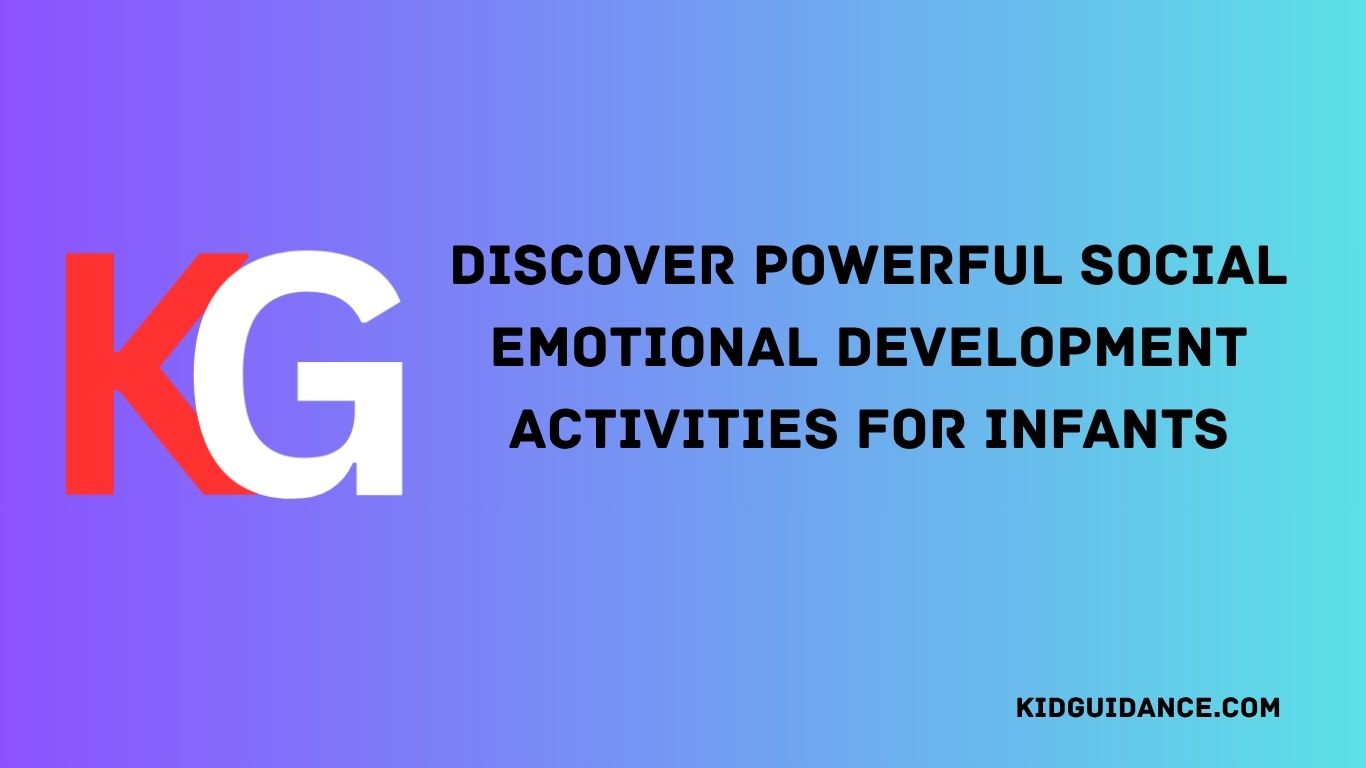Being a new parent can feel overwhelming. You might wonder how to support your baby’s emotional growth. Social emotional development activities for infants are easy ways to help your baby grow. These activities build trust, help babies recognize emotions, and strengthen bonds. I’ve learned that simple, everyday moments make the biggest difference. Let’s explore some fun activities that can help your baby develop these important skills.
What is Social Emotional Development in Infants?
At its core, social emotional development in infants is about how they start to understand and manage their emotions and how they relate to others. This process begins the moment they are born and continues throughout childhood. Infants are naturally curious and ready to form bonds, and it’s through interactions with their caregivers that they start learning how to express emotions, form attachments, and understand others’ feelings. These early experiences have a lasting impact on their ability to connect with others and regulate their emotions as they grow.
Why is Early Social Emotional Development Important?
The first two years of life are critical for social and emotional development. Infants rely on caregivers for comfort, security, and emotional guidance. Research shows that infants who form strong, healthy bonds with their caregivers are better equipped to regulate their emotions and manage social interactions later in life. Early experiences with love, nurturing, and emotional support set the foundation for an infant’s emotional health and resilience.
What Are Social Emotional Activities for Infants?
Social emotional activities for infants are simple yet impactful ways to help babies develop emotional awareness, empathy, and social skills. These activities don’t need to be complicated—what’s most important is the engagement, connection, and consistency that caregivers provide. Here are some of the best activities for fostering social emotional development:
Tummy Time with Engagement
Tummy time is a classic activity that promotes physical development, but it also supports social and emotional growth. When your baby spends time on their stomach, it allows them to interact with the world in a new way. Add your own interaction—talk to them, smile, and make eye contact. This helps babies build trust and bonds with you as their caregiver.
Peek-a-Boo Games
The simple game of peek-a-boo is one of the most powerful social emotional activities you can do with your infant. It teaches babies about object permanence—understanding that things still exist even when they can’t see them. More importantly, it creates opportunities for emotional bonding, laughter, and shared joy, which are key for emotional development.
Singing and Talking to Your Baby
Even if your baby can’t understand the words, singing and talking to them builds a sense of connection. Your tone, rhythm, and the act of engaging with them help them feel secure and loved. Narrating your day or singing lullabies not only enhances language development but also helps babies feel more emotionally attuned to you.
Cuddling and Physical Touch
Never underestimate the power of physical touch. Holding, hugging, or gently rocking your baby sends messages of safety and love. These acts of physical affection are foundational for emotional attachment and security. They help babies understand that their emotional needs are being met and that they can rely on their caregivers for comfort.
How Do These Activities Benefit Infants?
Each of these activities plays an important role in your baby’s social and emotional development. From the security of tummy time to the fun of peek-a-boo, these activities help babies develop their emotional vocabulary, build attachments, and learn to regulate their emotions. As you engage in these activities, you’re helping them understand their feelings, build empathy, and feel loved and supported.
How to Promote Social and Emotional Development in Infants?
Beyond specific activities, there are several ways to promote social emotional development in infants:
The Role of Caregivers in Emotional Development
Caregivers are the primary influencers in an infant’s emotional development. Your responses to your baby’s needs—whether it’s picking them up when they’re upset, offering a comforting voice, or providing consistency—teach your baby that the world is a safe place where their emotions are understood and cared for. When you’re emotionally available and responsive, your baby learns to regulate their feelings and trust others.
Daily Routines that Foster Emotional Growth
The beauty of social emotional development activities is that they can be woven into your daily routines. Simple actions, such as speaking calmly during diaper changes, making eye contact during feedings, or comforting your baby after a nap, create opportunities for emotional connection throughout the day. These small interactions help your baby feel secure and supported.
Creating Safe and Stimulating Environments
Infants learn through exploring their environment, so creating a safe, nurturing space for them to explore is essential. Make sure their surroundings encourage curiosity and emotional expression. Consider sensory-friendly spaces where babies can interact with different textures, sounds, and sights, helping them develop a sense of emotional awareness and self-regulation.
What Are Some Activities for Social Emotional Development?
It’s important to engage your baby in play activities that support social emotional growth. Here are a few to consider:
Interactive Play Activities
Games like rolling a ball back and forth, playing with soft dolls, or reading interactive books with textures and sounds encourage your baby to engage emotionally. These activities teach turn-taking, emotional expression, and the joy of shared experiences.
Mirror Play for Emotional Awareness
Babies love looking at themselves in mirrors, and this activity can be used to help them understand and recognize emotions. You can make faces in front of the mirror and encourage your baby to mimic them, helping them connect emotions with facial expressions.
Exploring Touch and Texture
Infants are naturally curious about the world around them. Introducing them to different textures—like soft blankets, textured toys, or water play—helps them develop self-regulation. These activities also promote sensory development and emotional awareness as babies learn how different sensations make them feel.
Social and Emotional Development of a 6 to 12-Month-Old
As babies grow, their social and emotional development continues to evolve. From 6 to 12 months, babies start to form stronger attachments to caregivers, recognize familiar faces, and experience a wider range of emotions.
Key Milestones:
- Attachment to caregivers becomes stronger: Babies start to seek comfort from familiar faces, which deepens their emotional connections.
- Increased social interaction: Babies begin to engage more with familiar people and show interest in playing with others.
- Awareness of emotions in others: They start recognizing facial expressions and may respond to others’ emotions by mirroring them.
Activities to Support 6-12-Month-Olds:
- Games involving turn-taking: Simple activities like rolling a ball or playing pat-a-cake help babies practice social interaction.
- Responding to emotional cues: Babies will start showing more emotion, so validating those feelings with words like “I see you’re sad” helps them learn emotional regulation.
- Talking and singing: Encouraging emotional connections through consistent, loving communication helps babies understand and manage their emotions.
Tips for Parents and Caregivers
Be Present and Mindful
Your baby thrives when you are fully engaged during playtime and interactions. Putting away your phone, focusing on your baby’s needs, and making eye contact shows them that they are your priority, which helps foster emotional growth.
Model Positive Emotions
Babies learn by watching, so modeling positive emotional behaviors, such as calmness in stressful situations, helps your baby learn how to express emotions healthily. Always be mindful of how your own emotions are portrayed in front of your baby.
Balance Stimulation with Calmness
Too much stimulation can overwhelm a baby. Ensure that after active, engaging activities, you provide moments of calmness—whether through cuddles, soothing music, or quiet moments to help them regulate their emotions.
FAQs
What are social emotional activities for infants?
Social emotional activities for infants help them develop emotional intelligence, empathy, and social skills. These include simple games like peek-a-boo, tummy time, and talking to your baby.
How can I promote social and emotional development in my infant?
You can promote your infant’s social and emotional development through activities like cuddling, singing, and interactive play. Consistent, loving engagement builds emotional trust.
Why is social emotional development important for infants?
Social emotional development is crucial for infants as it helps them build healthy relationships, manage emotions, and adapt to new situations, which are vital skills for their overall well-being.
What activities can support emotional growth in infants?
Activities such as mirror play, reading, and playing with toys that encourage sharing help infants develop emotional awareness, empathy, and the ability to recognize and manage their feelings.
What is the social and emotional development of a 6 to 12-month-old?
Between 6 to 12 months, infants start recognizing familiar faces, expressing emotions like fear or joy, and developing strong bonds with caregivers. They also begin to show signs of empathy.
How do social emotional activities help my baby’s development?
Social emotional activities help babies recognize and respond to emotions, form secure attachments, and learn to regulate their feelings, fostering healthy emotional growth.
Can I teach social emotional skills to my infant through play?
Yes, play is an excellent way to teach social emotional skills. Activities like turn-taking, mirror play, and expressing emotions through games support emotional understanding and self-regulation.
What are the benefits of social emotional development activities for infants?
These activities help build a secure emotional foundation, boost language development, improve relationship skills, and provide infants with the tools to handle their emotions in various situations.
How can I tell if my baby is developing socially and emotionally?
Look for signs such as eye contact, smiling at familiar people, responding to others’ emotions, and showing attachment to caregivers. These behaviors are signs of healthy social emotional development.
What’s the best way to start social emotional development activities for my baby?
Start simple by engaging in face-to-face activities like singing, talking, and playing games such as peek-a-boo. Consistent, loving interactions are key to fostering emotional connections.
Conclusion
Incorporating social emotional development activities into your baby’s routine is one of the most impactful things you can do as a parent or caregiver. These activities, whether it’s tummy time, peek-a-boo, or singing, lay the foundation for emotional intelligence and healthy social relationships. By being present, consistent, and responsive, you are fostering a supportive environment where your baby can thrive emotionally and socially.
Small actions, such as making eye contact, comforting during a tantrum, or playing interactive games, have a lasting impact on your baby’s emotional health. It’s through these simple, everyday moments that you help shape your baby’s future emotional well-being. Remember, the most important thing is the connection you create through love and consistency.




